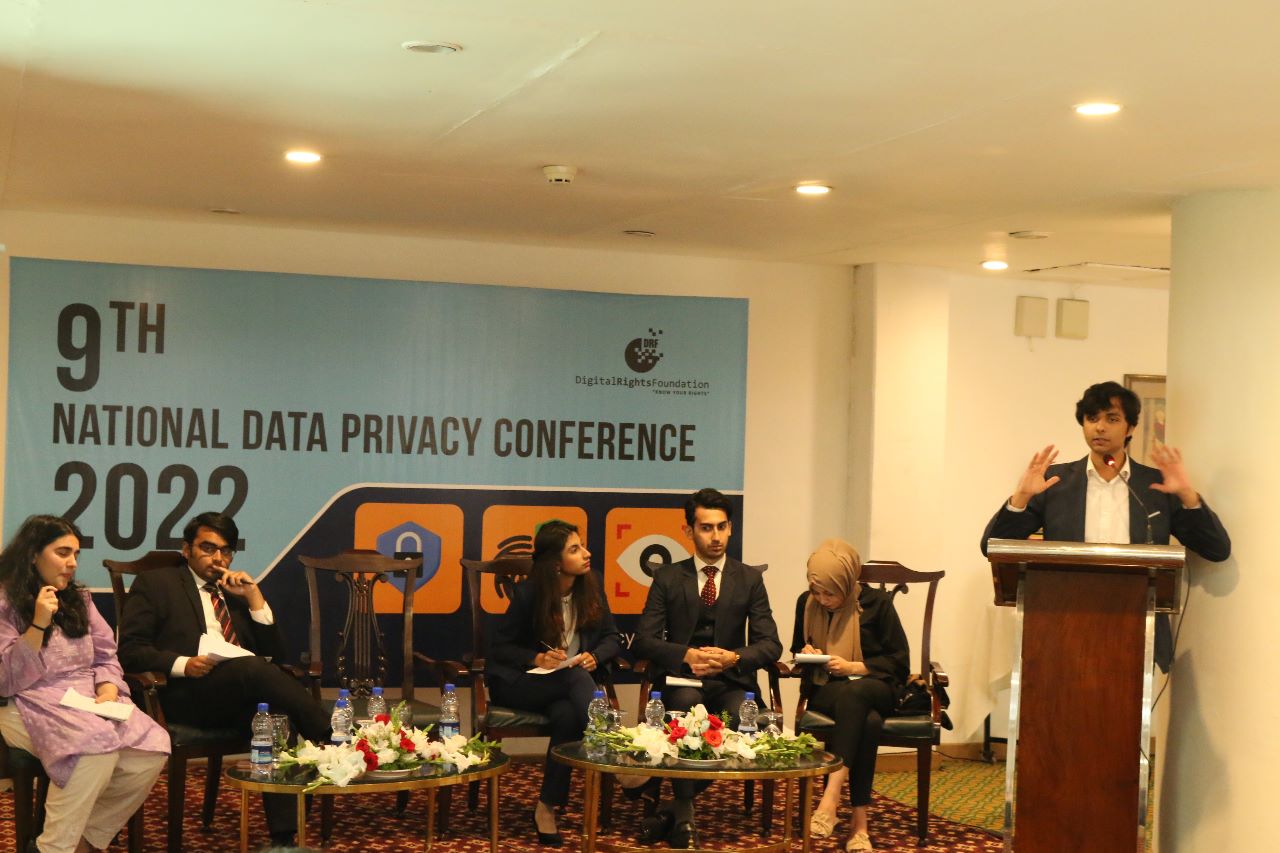Digital Rights Foundation’s 9th Annual National Privacy Conference held in Lahore

LAHORE: Digital Rights Foundation (DRF) hosted its 9th annual National Privacy Conference on Saturday the 19th of November, 2022 at the Avari Hotel in Lahore. The conference brought together experts from different fields to discuss this year’s theme of the conference “People & Privacy”, shedding light on the all-encompassing nature of privacy rights and violations that we experience in different strands of society.
The welcome address was delivered by Zainab Durrani, Project Manager of DRF’s Data Privacy Portfolio. She welcomed the audience and panelists and highlighted the importance of privacy considerations in everyday life and the need for privacy-centric and human rights-friendly regulations in the country. Nighat Dad, Executive Director of DRF, noted that the “DRF’s annual conference on privacy has become an institution that hosts cutting-edge discussions regarding privacy, grounds them in the Pakistani context, and provides a space by bringing together the leading experts in the country.”
The keynote address was delivered by Angbeen Mirza, a legal academic and an Assistant Professor at the Shaikh Ahmad Hassan School of Law (SAHSOL), LUMS. Angbeen stated that Article 14 of the Constitution guarantees our privacy, however it is important to operationalize it through a law that protects our right to privacy. Angbeen shared that “the Personal Data Protection Bill has yet to be presented as a law, a law that has become even more important in light of rapid digitization in a post-Covid world.”
The first panel ‘People on Privacy’ included transgender activist Jannat Ali, journalist Amel Ghani, and Barrister Jannat Kalyar. The panel highlighted the importance of privacy in social movements from a people’s perspective and the need for popularizing privacy and making it more accessible to the masses. Barrister Jannat Kalyar on the panel said “we need to place the human in the entire framework of privacy, focusing on human dignity when individuals are not discriminated against because of their class, caste, race, or religion, and this dignity is guaranteed to us in the Constitution.” Jannat Ali highlighted that proposed amendments to the Transgender Persons (Protection of Rights) Act, 2018 seek to violate the privacy of the trans community by subjecting them to intrusive medical examinations. She urged the audience to “stand with the community at this time, rather than trying to work for us.”
After the panel a debate took place on the topic: ‘This house believes that privacy is a western concept’. The lively debate was led by two teams, each representing participants from DRF’s legal team, Shehrzade Amin and Ms. Aqsa, as well as students from Forman Christian College (FCCU) and Government College University (GCU) Maria Waqar, Muhammad bin Munir, Muhammad Hamza Aziz, and Ali Zar.
The last panel ‘Ensuring Dignity in Privacy Rights’ included Bushra Mahnoor from the Mahwari Justice Campaign, Umer Rajpoot from Todd’s Welfare Society, journalist Mehmal Sarfaraz and senior lawyer and activist Saroop Ijaz. The panel took a different approach and focused on dignity-based perspectives on privacy, centering privacy subjects above all else. The perspectives shared by the panelists highlighted privacy rights in the realities of marginalized populations. Saroop noted that after the legal issues regarding wiretapping were raised in the Benazir Bhutto case, “we not only failed to ensure robust legislation on privacy and data protection, the rising role of private actors and the state has made things a lot worse.” Speaking to decenter the human centric conception of privacy, Umer also highlighted the ways in which animals need to be recognised as non-human citizens of this country and thus deserving of rights such as privacy. Bushra highlighted that “period dignity during flood relief should be connected with privacy to ensure that people are comfortable, but privacy should not prevent us from fighting stigmas associated with menstruation cycles and period blood.”
The guest of honor and concluding remarks were given by activist and former chairperson of NCSW Khawar Mumtaz. In her closing remarks, she emphasized the importance of art and performance in ensuring social change, and changing attitudes regarding privacy rights. Ms. Mumtaz announced the winner of the artwork competition Maha Bint Abid who won a cash prize at the event with her artwork which was also displayed at the conference.
Digital Rights Foundation is a registered research-based NGO in Pakistan. Founded in 2012, DRF focuses on ICTs to support human rights, inclusiveness, democratic processes, and digital governance. DRF works on issues of online free speech, privacy, data protection, and online violence against women.var /*674867468*/





